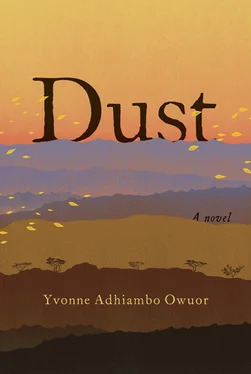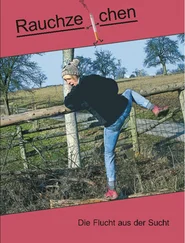Nyipir does not move.
She breathes, “Please.”
Straining, Nyipir swallows. Closing his eyes, he lets his right hand rest on her back.
Akai-ma exhales.
Stillness.
Then he sighs. “Why?”
Akai says, “They asked me for a sacrifice. They took the ones the river left behind.”
“The river …”
“Is swollen. Its raining somewhere.”
“Nothing’s left? Not even a goat?”
Silence.
“Nothing.”
“Jayadha, my red dance-ox?”
Silence.
Nyipir’s broken hand covers his face. He murmurs, “I yearned for you.” Nyipir sees his life drift from him.
“I longed for you. I’ve waited …”
Silence.
Akai’s voice is tentative. “You sent Ali.”
“Yes.” He gestures at the empty compound.
Akai looks. This man, this husband, her guardian, her protector.
Today, eyes like cold stone.
A fog of sadness engulfs them both.
Nyipir tries to prevent shimmering tears from shaming him, but every part of his being hurts, everything within him longs to cry out. He says, “We’ve now buried Hugh.”
Akai stares at the ground.
“We’ve buried our son.”
Silence.
“Couldn’t wait.”
Akai looks up at Nyipir, her heart in her eyes. Forgive me . Nothing. No sound. Shoulders droop.
Nyipir cups her face. “Akai, remember, you also have a daughter.”
She turns her face into his hands and inhales the unchanging warmth of them.
IN THE DISTANCE, DOUM PALMS WAIL. SHADOWS LENGTHEN. The landscape is on fire. Akai-ma finds Ajany with her head against Odidi’s stone resting place. She sits down near her, forcing herself to stay, facing death, that shadow presence that hovered when this child was born. Staying put, even though she still believes Ajany is destined to abandon her. Akai’s hand almost touches Ajany’s head. “My child, you’re here.”
Ajany’s body curves away. Chin on knees, she looks sideways at Akai-ma.
No answer.
Akai hears storms swirl within her being, she remembers leaving Wuoth Ogik, hearing voices shouting within her, following those voices, their alarm, into dark stillness. Like now. Sometimes the mist descended inside her, burying her thoughts. Like now. She forces herself to speak out the memory.
“My children were alone,” Akai tells Ajany.
She scours the old desiccated landscape.
She makes a half-groaning noise. Churning darknesses.
The chaos that erupts and interrupts Ajany’s flow of feeling when she is close to her mother grabs her, shakes her, and then she hears Akai-ma bleat: “Odidi!”
Ajany listens, imagining for an instant that there will be an answer.
“My boy,” Akai cries.
Then.
Stillness.
“Ewoi-Etir,” Akai calls. “Ewoi-Etir-Ewoi-Etir-Ewoi-Etir.”
When Akai seizes Ajany, Ajany howls. It is a terrible strangled sound that confirms her fear that her mother is finally going to kill her.
The cry.
Nyipir, Isaiah, and Galgalu run toward it.
Nyipir rushing ahead of them. He skids to a stop.
Ajany is cradling Akai-ma, whose body is bent into a ball. Ajany rocks her. A pang and pressure dessicate Nyipir’s chest. He drags himself a short distance away, the others follow, but still within earshot.

Skin to skin, face touching face, heart to heart, now Ajany can taste sorrows woven into Akai-ma. They have always been there; she has just not known how to look before. Feeling its hugeness, Ajany understands how much shelter it has needed. Why it had to detach from Wuoth Ogik and wander.
“Akai-ma?” Low-voiced, “Who is Ewoi? Who is Etir?”
Akai squeezes Ajany’s body. “You were born hot,” she says. “You should’ve died.”
Tears spurt. Ajany stutters, “You wanted me t- to die?”
Akai-ma moans, “Nooooo.”
She had separated herself from Ajany’s life early, daring death to take her, vowing indifference. Yet the child was still alive. It was her brother, who was born cool, who had been snatched from her.
Akai shivers, eyes dark.
Ringing in her ears. A subdued tone: “Ewoi, Etir are your brother and sister.”
Ajany coughs.
Then, “What?”
Akai says, “I lost them on the same day.”
Stillness.
Her life once apportioned hope for people and places:
For Hugh.
For Ewoi and Etir.
For Nyipir.
For Odidi.
But she had not hoped anything for her fourth-born child — this daughter. It had been like that from the start, when she found out so late that she was pregnant. The baby, a tiny girl, was born prematurely, and fevered. There were no midwives close by. Nyipir, who could have helped, was stuck in the entrails of the Kenyan state. Galgalu, so young himself, had battled to bring the creature out of Akai’s womb. Akai’s heavy bleeding had muddied the ground. The little thing had been born with a head full of hair and large, fathomless eyes that connected to invisible things. She also seemed to understand every uttered word.
The baby did not cry.
Akai had not named the baby.
Later.
When she was able to walk, Akai had wandered away from Wuoth Ogik, seeking news of Nyipir at watering holes and centers of trade. She had strapped the nameless girl on her back, walking in circles.
After six days, the baby all of a sudden refused to suckle.
Soon Akai had nothing left to give her. At midday, in the heat, Akai had fallen to the ground, clawed it open, and screamed and screamed out Nyipir’s name. As she covered the hole with earth, a season’s harbinger — a secretary bird, one with a half-eaten snake — had landed and stared straight at her.
Akai tried to again breastfeed the child.
The child bawled.
The bird stared.
Akai told herself, At least I have a son .
She told the bird, Take it, then .
She put the baby under a Mareer tree, and then she ran away.
Akai crawled into Wuoth Ogik three days later and found a way to the livestock boma , where she curled up next to the fire.
“Where’s baby?” Galgalu had woken her up
“Where baby?” lisped Odidi. “I want baby.”
Akai had stared at them blankly. “Baby?”
Galgalu had swept Odidi up and run into the landscape. Tracking Akai’s footsteps, they searched every bush. Galgalu whistled for honey birds. Four showed up to lead him to honey, but not to the baby.
Four days later, as Galgalu and little Odidi walked slowly back to Wuoth Ogik, Akai saw Odidi clutching a soiled, silent bundle to his chest.
“She’s dead,” Akai said.
Odidi turned on her, eyes afire. He said in an old man’s voice, “This is my baby.”
Galgalu did not stop to talk to her. He went straight to his hut.
Odidi started calling the baby “Ol Arabel,” after a river, for he was four and already understood thirst. He thought every river was Ol Arabel. Galgalu called the baby Arabel, which was the name of a cool, green mountain.
The feelings from that season pound Akai’s mind and heart, making her body clammy. What should she tell Ajany? She glances at her.
Arabel. Ajany. Oganda. The child still listened with her eyes.
“I was also born hot,” Akai says. “As you were. Odidi was born cool. Those born hot die, can even die of nothing. I was not expecting you, but you came, and when you were born, you were fire.”
Ajany winces.
Nyipir eavesdrops.
Akai says, “I became Turkana, but before that, I was Dodoth. I left school to meet one man, my father. But I met two. One is Nyipir. The other, Hugh Bolton. They were together.”
Ajany is suddenly cold. She rubs her arms up and down. She blows into her hands.
Читать дальше












